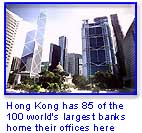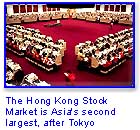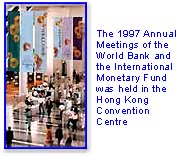
Hong Kong is an important international financial centre. It is currently the fourth-largest financial centre in the world (after New York, London and Tokyo); second largest stock market in Asia; and fifth largest foreign exchange market. Besides, it is the leading source of foreign direct investment in Asia.
There are 85 of the world's largest banks home their offices in the territory. Also, Hong Kong is the region's leading fund management centre, with 87 authorized fund houses.
This success is contributed to:

 The movements of the Hong Kong Stock Market are part of daily life in Hong Kong, where business is a 24-hour-a-day passion, seven days a week.
The movements of the Hong Kong Stock Market are part of daily life in Hong Kong, where business is a 24-hour-a-day passion, seven days a week.
 Have a well regulated and transparent financial system backed by international standards of "due diligence" and a strong anti-corruption regime.
Have a well regulated and transparent financial system backed by international standards of "due diligence" and a strong anti-corruption regime.
 A cluster of competent human resources and expertise to support this major financial centre.
A cluster of competent human resources and expertise to support this major financial centre.
 The well-developed financial services sector offers international experience in banking, corporate finance, fund management, insurance, stockbroking and investment.
The well-developed financial services sector offers international experience in banking, corporate finance, fund management, insurance, stockbroking and investment.

 Hong Kong is one of the world's leading international banking centres. As of December 31, 1996, there were 151 foreign banks with 465 branches and 31 local banks with 1,011 branches.
Hong Kong is one of the world's leading international banking centres. As of December 31, 1996, there were 151 foreign banks with 465 branches and 31 local banks with 1,011 branches.
 Hong Kong becomes a major financial centre of China as the economy of china continues to grow and there is a need of major financing.
Hong Kong becomes a major financial centre of China as the economy of china continues to grow and there is a need of major financing.
 No foreign exchange control in the territory.
No foreign exchange control in the territory.
 The Hong Kong dollar is freely convertible. Any currency, including mainland China's renminbi (Rmb), can be bought and sold on the open market.
The Hong Kong dollar is freely convertible. Any currency, including mainland China's renminbi (Rmb), can be bought and sold on the open market.
 The territory's strategic geographic position as a bridge in the time gap between North America and Europe, its strong links with China and regional economies, plus its excellent communication facilities, have aided its financial development.
The territory's strategic geographic position as a bridge in the time gap between North America and Europe, its strong links with China and regional economies, plus its excellent communication facilities, have aided its financial development.

